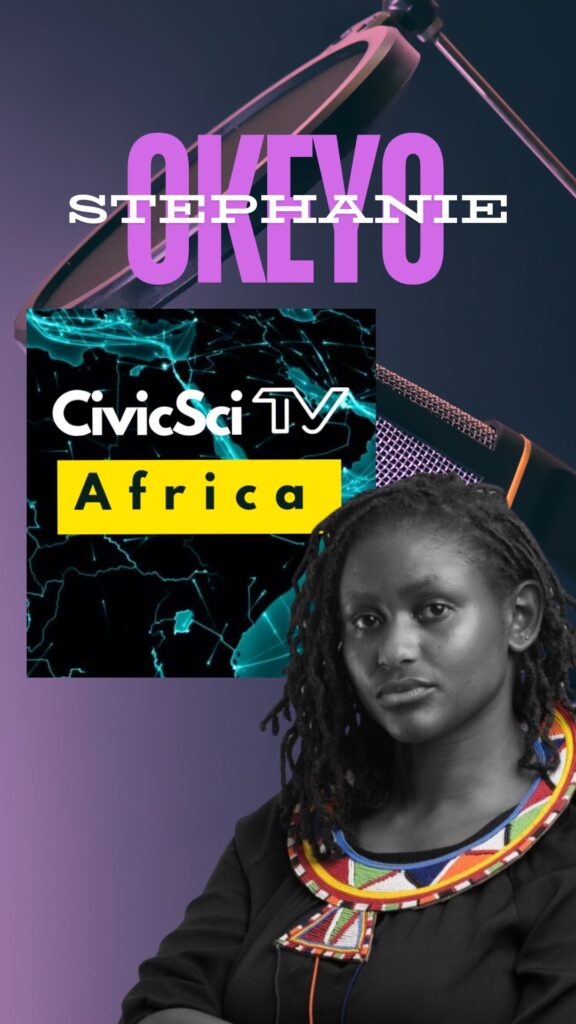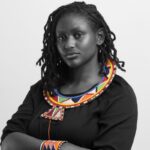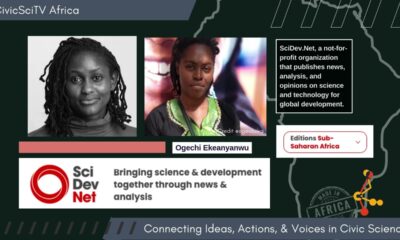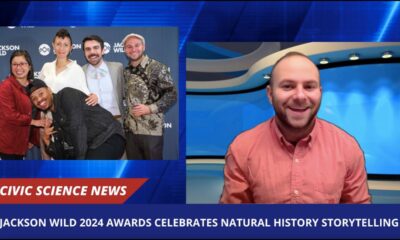CSM International Program
Co-founder of the Terra-NatureWild Conservation and host of ‘A Just Natural Africa’ podcast speaks with CivicSciTV Africa (Part 1)

In this interview, I spoke with Aiita Apamaku, a wildlife biologist, National Geographic explorer, co-founder of the Terra-NatureWild Conservation, and host of ‘A Just Natural Africa,’ a six-part podcast that explores Africa’s protected and conserved areas. The podcast highlights diverse narratives and insights from young African conservation champions across the continent.
This interview has been lightly edited for length and clarity.
Stephanie Okeyo: Thank you for joining us today Aiita.
Aiita Apamaku: It’s a pleasure to be here.
Stephanie Okeyo: Just to start off, why the name ‘A Just Natural Africa’?
Aiita Apamaku: I’ll break it down word by word. ‘Just’ sets the context that we are focusing solely on the natural aspects of Africa. We know there’s so much to consider on the continent, but we are defining the scope to focus specifically on nature. ‘Natural’ reflects the incredible biodiversity and richness of the ecosystems, and ‘Africa’ brings in the diversity of voices and perspectives from young African conservation champions. The podcast explores these perspectives to give a holistic view.
Stephanie Okeyo: What inspired you to start a podcast focusing on biodiversity?
Aiita Apamaku: I have a background in wildlife conservation and biology. Over time, I transitioned from fieldwork to conservation policy and science communication. Along the way, I realized biodiversity connects to everything we do. Conservation, at its core, is about communication—verbal and non-verbal. This podcast allows us to explore and share diverse cultural and ecological perspectives across Africa.
Stephanie Okeyo: Gazetted areas seem to be a major focus in your discussions. Why is that?
Aiita Apamaku: Gazetted areas bring up important questions about conservation. Are they truly serving their intended purpose, or are they limiting conservation efforts? Historically, many of these areas were established without considering the communities that have coexisted with nature for generations. There are also human rights issues tied to these areas, and I am keen to explore the intersection of conservation, policy, and local community interactions.
Stephanie Okeyo: Why is it important to highlight African narratives in conservation?
Aiita Apamaku: Africa is rich in biodiversity and cultural diversity. Conservation efforts must recognize both tangible and intangible cultural aspects, such as spiritual connections to the land. Traditional knowledge has always played a key role in environmental stewardship. However, modern conservation strategies often overlook these perspectives. African narratives are crucial to redefining conservation models that work for the continent.
Stephanie Okeyo: You’ve mentioned working at the intersection of research, policy, and science communication. How has that experience been, and what challenges have you encountered?
Aiita Apamaku: Working within these spaces has been insightful but challenging. One of the major challenges is the disconnect between scientists, policymakers, and communicators. Scientists often conduct crucial research but struggle to communicate findings in ways that influence policy. Policymakers, on the other hand, may not fully understand scientific processes but are tasked with making impactful decisions. This gap affects conservation effectiveness, as policy frameworks often do not align with the realities on the ground. Through my podcast and professional engagements, I am exploring ways to bridge this gap by improving communication strategies between researchers and policymakers.
Stephanie Okeyo: What are your thoughts on how to improve the science-policy interface in conservation?
Aiita Apamaku: I believe it starts with simplifying scientific communication and making it accessible to policymakers and the public. Policymakers need evidence-based insights that are digestible and actionable. Additionally, scientists must engage more proactively in policy discussions, ensuring their work informs regulations and conservation models. We need collaborative spaces where scientists, policymakers, and local communities can co-create solutions that align with both scientific evidence and cultural realities.
Stephanie Okeyo: What are the advantages of using a podcast as a medium?
Aiita Apamaku: Podcasts are convenient, allowing people to multitask while listening. The auditory format improves imagination, helping listeners visualize what they hear. With the saturation of visual media, podcasts provide a fresh alternative and cater to audiences who prefer listening over watching.
Stephanie Okeyo: What has your experience been like as an African science podcaster?
Aiita Apamaku: It’s been challenging but rewarding. Science communication requires simplifying complex concepts for a wider audience. Many scientists struggle with using less jargon and making their work more accessible. Podcasting has helped me refine my communication skills and engage with a broader audience.
Stephanie Okeyo: What advice would you give to aspiring science podcasters?
Aiita Apamaku: Just start. There’s no one-size-fits-all approach. You learn as you go. Speak in simple terms and reduce the use of jargon. If you don’t try, you’ll never know what to expect. It’s a learning process, and talking to experienced podcasters can help.
Stephanie Okeyo: What opportunities has your podcast provided for you?
Aiita Apamaku: It has expanded my network and helped me connect with conservationists across Africa. It has provided insights into the challenges of conservation policies and their implementation, while also helping me better understand the link between conservation science, policy, and communication.
Stephanie Okeyo: What are your future plans for the podcast?
Aiita Apamaku: I plan to simplify the language further and explore ways to localize the content, possibly introducing different dialects. The goal is to make the podcast as accessible and relatable as possible.
Stephanie Okeyo is a Microbiologist and Science Communicator. She is the founder of Under the Microscope. Some of her previous professional roles include Ambassador of Women in Science, East Africa and Representative to the United Nations office, Geneva at the Royal Academy of Science International Trust (RASIT). In 2019, she was listed as one of Under 30: Breaking Barriers Women in STEM and is a 2021 Zuri STEM category nominee. Stephanie is passionate about empowering young girls and being a voice for gender equality in Science and Technology.

-
 Audio Studio1 month ago
Audio Studio1 month ago“Reading it opened up a whole new world.” Kim Steele on building her company ‘Documentaries Don’t Work’
-
Civic Science Observer1 week ago
‘Science policy’ Google searches spiked in 2025. What does that mean?
-
Civic Science Observer1 month ago
Our developing civic science photojournalism experiment: Photos from 2025
-
Civic Science Observer1 month ago
Together again: Day 1 of the 2025 ASTC conference in black and white
Contact
Menu
Designed with WordPress
























